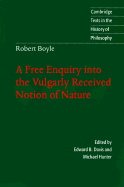Book contents
- Frontmatter
- Contents
- Acknowledgements
- List of abbreviations
- Introduction
- Chronology
- Further reading
- A note on the text
- A Free Enquiry into the Vulgarly Received Notion of Nature
- The Preface
- Section I
- Section II
- Section III
- Section IV
- Section V
- Section VI
- Section VII
- Section VIII
- Glossary
- Index
- Cambridge Texts in the History of Philosophy
Section IV
Published online by Cambridge University Press: 05 June 2012
- Frontmatter
- Contents
- Acknowledgements
- List of abbreviations
- Introduction
- Chronology
- Further reading
- A note on the text
- A Free Enquiry into the Vulgarly Received Notion of Nature
- The Preface
- Section I
- Section II
- Section III
- Section IV
- Section V
- Section VI
- Section VII
- Section VIII
- Glossary
- Index
- Cambridge Texts in the History of Philosophy
Summary
Having shown that the definition given of nature by Aristotle himself, as great a logician as he was, has not been able to satisfy so much as his interpreters and disciples what his own idea of nature was, it would be to little purpose to trouble you and myself with enquiring into the definitions and disputes of other Peripatetics about so obscure and perplexed a subject, especially since it is not my business in this tract solicitously to examine what Aristotle thought nature to be, but what is to be thought of the vulgarly received notion of nature. And though of this the schools have been the chief propagators, for which reason it was fit to take notice of their master Aristotle's definition, yet the best way I know to investigate the commonly received opinion of nature is to consider what effata or axioms do pass for current about her, and what titles and epithets are unanimously given her, both by philosophers and other writers and by the generality of men that have occasion to discourse of her and her actings. Of these axioms and epithets, the principal seem to be these that follow.
Natura est sapientissima, adeoque opus Naturœ est opus Intelligentiœ.
[Nature is a most wise being, and thus the work of Nature is the work of Intelligence.]
Natura nihil facit frustra. [Nature does nothing in vain.]
Natura fine suo nunquam excidit. [Nature never misses her own goal.]
Natura semper facit quod optimum est. [Nature always does that which is best.]
- Type
- Chapter
- Information
- Publisher: Cambridge University PressPrint publication year: 1996



